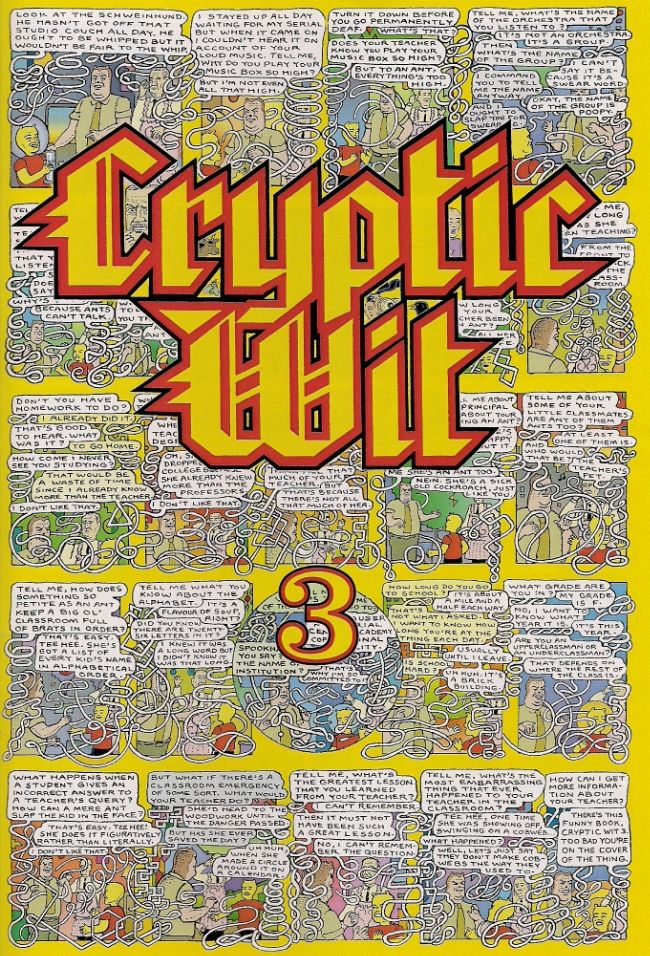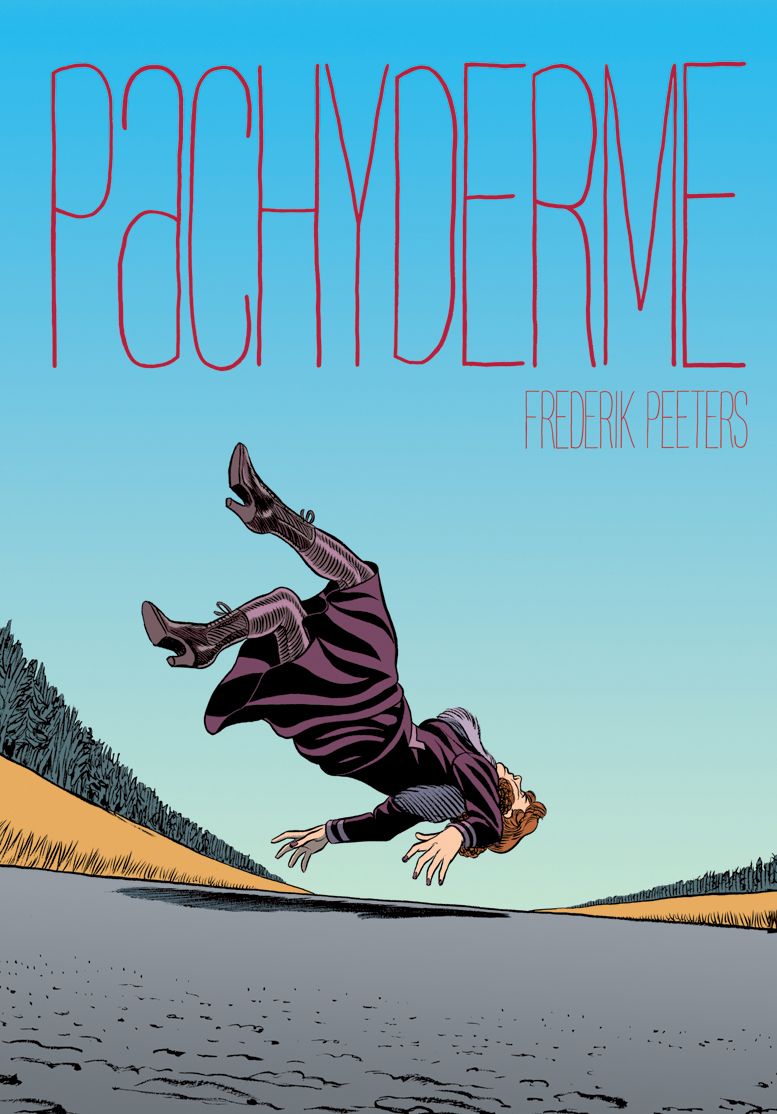It happens every year: Despite the best efforts of authors, publishers and publicists, there are smart, funny and downright entertaining comics that fail to get their proper due. It's a truth made more manifest every year as production and publishing costs are lowered and more and more people find ways of getting their work on print or online.
So once again I've put together a list of some books I thought could have used a bit more love, at least in terms of coverage if not also sales (though usually it's both). These aren't necessarily the best books of the past year – I'm not sure I'd swap any of them out for my own top 10 list – they're just really good comics that didn't seem to get enough attention. Let me know what you'd add to the list in the comments section below.
1. Cryptic Wit #3 by Gerald Jablonski (self-published). Is there a more idiosyncratic, original and outright bizarre cartoonist working today than Gerald Jablonski? I submit that there is not. It's hard to imagine how there could possibly be someone working in a more obsessive and denser fashion than Jablonski, what with the tiny, tiny print and balloon tails that loop every which way and seemingly endless variations on the same basic theme. I don't have the space here to fully describe the experience of reading Jablonski's comics, I'll have to leave that to Joe McCulloch to summarize. Suffice it to say that despite the effort required in reading Cryptic Wit (this isn't a comic you can consume in one sitting), it's such a strange and genuinely funny comic I'm surprised it hasn't picked up more of a cult audience. But sadly the release of the third issue garnered little more than silence apart from McCulloch's. Part of that might be due to the fact that Jablonski (who is something of a mystery) has only made his comic available through the print-on-demand site Indy Planet. Still, it's a comic that deserved a lot more discussion. And a lot more readers.
2. Pachyderm by Frederik Peeters (SelfMadeHero). Comparisons to filmmaker David Lynch are a dime a dozen these days, but Pachyderm, the second of two Peeters books SelfMadeHero released in 2013, earns it rather well. This dreamlike tale of a woman who comes to a hospital looking for her husband, who was allegedly injured in an accident, lets you know from the outset that all is not what it seems with a car accident caused by a small elephant, and things just get stranger and more labyrinthine from there. Much is hinted but little is confirmed or explained, as it should be with a work of this nature. Some of the allusions – the phallic appendage of the mysterious government agent – are a bit too on the nose but overall Pachyderme manages cast a engrossing, haunting spell that anyone who appreciates a subtle mystery would do well to check out.
3. Ray and Joe: The Story of a Man and His Dead Friend by Charles Rodrigues (Fantagraphics). One of the gaping holes in this golden age of reprints is the abundance of great work published in National Lampoon magazine in the '70s and early '80s. We're long past due, for example, a Trots and Bonnie collection, and I would pay good money for a Politeness Man book. Fantagraphics and Bob Fingerman attempted to fill that hole, at least partially, last year with the release of Ray & Joe, which collects the short stories Rodrigues created for the magazine (a collection of Rodrigues' gag cartoons is planned for the near future). As you might guess from the title, Rodrigues mined a very dark vein of humor, filled with offensive jokes about sex, death and the sorts of body functions we prefer not to discuss in public, not to mention all manner of jokes dealing in various racial and ethnic stereotypes. Yet Rodrigues is so gleeful and all-encompassing in his misanthropy that it's hard not to laugh, even if you're wincing at the same time. If that isn't the mark of a noteworthy cartoonist, I don't know what is.
4. S.F. 3 by Ryan Cecil Smith (Koyama Press). For the past few years, Ryan Cecil Smith has been slowly crafting a homage to the sci-fi manga and Western comics of yesteryear that's both tongue-in-cheek and completely earnest. Smith kicked things up a notch this year with the release of Issue 3, in part by teaming up with Koyama Press, but also by producing a longer and larger chapter in his ongoing space opera. It remains a fun and funny comic, able to balance both a large cast and high-pitched melodrama while still winking at the reader, all rendered in his deceptively simple style. More people should be talking about this comic.
5. Island of Memory by T. Edward Bak (Floating World). I'm a sucker for history comics anyway, but the unique perspective of this particular book (a naturalist/explorer trapped in the freezing Siberian hinterlands ruminates on his life back home while trying to stay warm and alive), combined with Bak's delicate use of color and angular, semi-cubist art that calls to mind folks like Cezanne and Chagall, made this a must-own for me. I especially love how Bak is able to convey the harshness of both the terrain and the weather. But apart from the occasional interview, I didn't see much written about Island, especially at the end of the year. Here's hoping future volumes in this ongoing saga buck that trend.
6. Science Fiction by Joe Ollmann (Conundrum Books). Ollmann received a lot of attention with his previous graphic novel Mid-Life, but this book – about a repressed and depressed high school teacher who becomes convinced he was abducted by aliens – seems to have sailed right under most people's noses. Ollmann's skill lies in creating rich, detailed characters and having them bump up against each other. In this case, that's the teacher, Mark, who becomes unglued after witnessing a film about UFO abduction, and his very skeptical girlfriend, Sue. Was Mark really kidnapped by aliens? Is he suppressing some other ugly memory? Or is he just having a nervous breakdown? Ollmann hints but wisely doesn't say. Really, that's not the point here. Instead he prefers to paint a portrait of a couple perhaps too comfortable with each other suddenly rent asunder and spiraling towards destruction. Frequently funny, sharply observed and always sympathetic, Science Fiction deserved better play than it got.
Runners-up: Bittersweet Romance by Victor Cayro; Hand-Drying in America by Ben Katchor; School Spirits by Anya Davidson; Infomaniacs by Matthew Thurber; The Art of Rube Goldberg (Abrams); Do Not Disturb My Waking Dream by Laura Park; Showa 1926-1939: A History of Japan by Shizeru Mizuki (Drawn & Quarterly).



